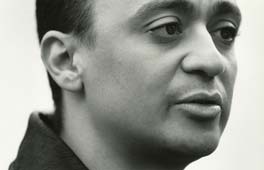
Salim Bachi
- Algeria, France
- Zu Gast beim ilb: 2006
Salim Bachi was born in Algiers in 1971 and grew up in Annaba in Eastern Algeria. He studied French Language and Literature in both cities and at the Sorbonne. He has been living in Paris since 1997. Bachi made his début with short stories, published in various newspapers such as »Le Monde diplomatique«. Already with his first novel »Le Chien d’Ulysse« (2001; t: Ulysses’s dog) which received three awards, Bachi proved himself to be an important representative of the flourishing literature from modern Maghreb. The story takes place in the fictional and archetypal Algerian city of Kirtha, whose very name refers back to the old numidic capital and to the multifaceted history of North Africa since Roman colonisation. As in James Joyce’s »Ulysses«, whose structure serves as a model, the plot is rich in allusions and takes place on a single day: on the fourth anniversary of the assassination of the Algerian president Boudiaf in 1992, when the conflict between the government and Islamists in the Algerian civil war was heading towards its climax. The nocturnal aberrations of a literature student, his dreams and fantasies, alongside the life stories of his friends and acquaintances, reveal the lack of orientation found in a whole generation, for whom all values have disappeared into violence and misery. Without taking a stand for one side, the multi-perspective novel creates a sometimes ironic portrait of society and, significantly, cannot be obtained in Algeria although it is not officially banned.
Bachi describes the precursors of present day Algeria in his second novel, »La Kahéna« (2003; t: Villa Kahéna), set in colonial times. At the centre is a house, built in the fictional city of Kirtha by a settler from Malta. After an adventurous trip to Cayenne and into the Brazilian rainforest, the settler obtains riches and honours, yet towards the end of his life he finds himself between the front lines of the colonial powers and the local population striving for independence. As in Bachi’s subsequent works, history here becomes a means of orientation for the future. »Memory can be an illness, a burden, but to hate memory means to lapse into barbarianism. One should not freeze memory and take the risk that it be transformed into myth, but for the same reason one shouldn’t hide it either.«
Bachi’s most recent novel, »Tuez-les tous« (2006; t: Kill them all), highlights the social and political backdrop of Islamic fundamentalism in the example of one of the culprits of the 9/11 attacks, and interprets it as a murderous way out of the dilemma of the modern Arab world, which both admires and despises the West.
The author was awarded the Prix Goncourt du premier roman, the Bourse Prince Pierre de Monaco de la découverte, the Prix littéraire de la vocation of the Marcel Bleustein-Blanchet Foundation, and the Prix Tropiques. He has been a guest of the Villa Medici in Rome and lives in Paris.
© internationales literaturfestival berlin
Der Hund des Odysseus
Lenos-Verlag
Basel, 2002
[Ü: Michael von Killisch-Horn]
Tuez-les tous
Gallimard
Paris, 2005
Autoportrait avec Grenade
Ed. du Rocher
Monaco, 2005
Villa Kahéna
Lenos-Verlag
Basel, 2006
[Ü: Regula Renschler]
Les Douze Contes de minuit
Gallimard
Paris 2007
Le Silence de Mahomet
Gallimard
Paris 2008
